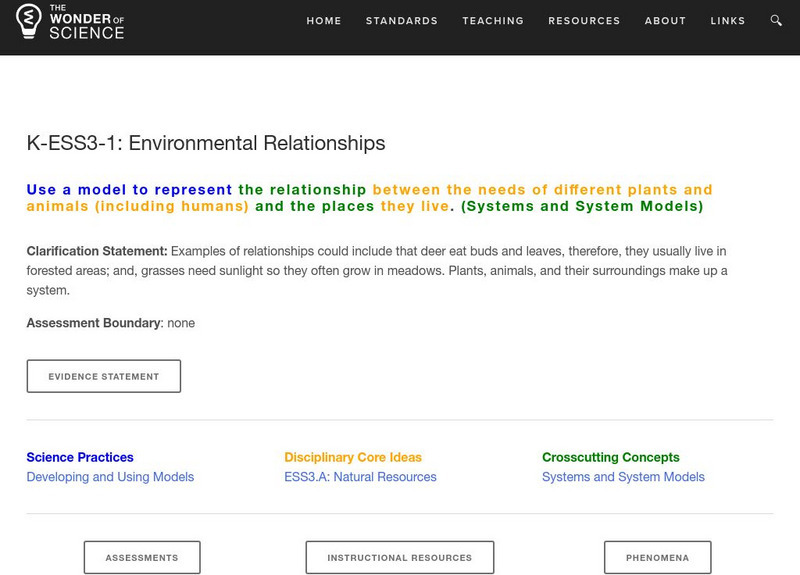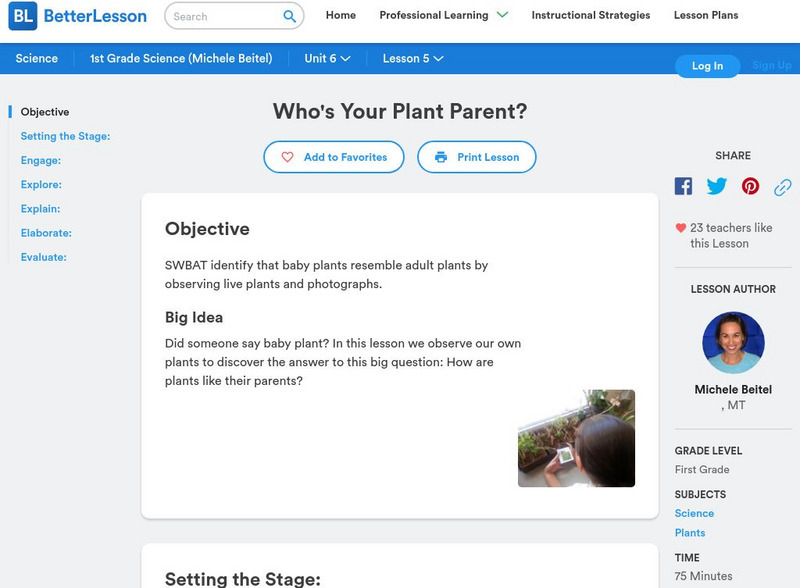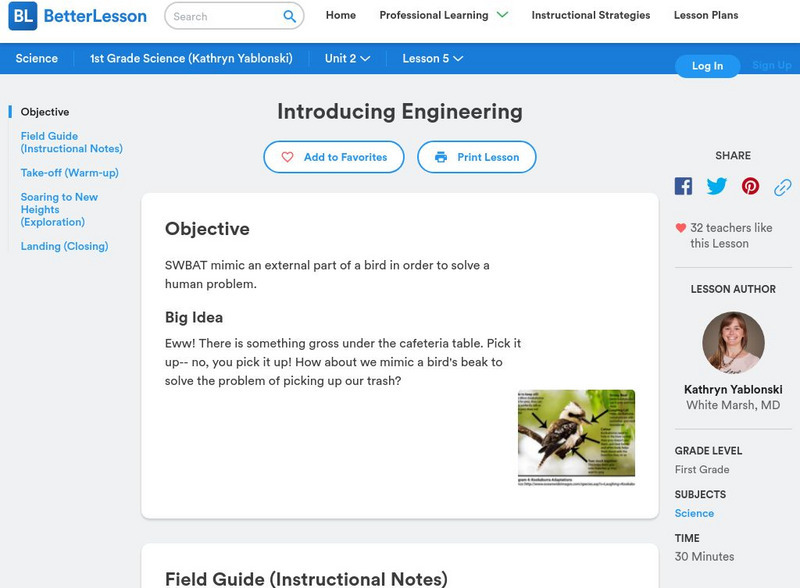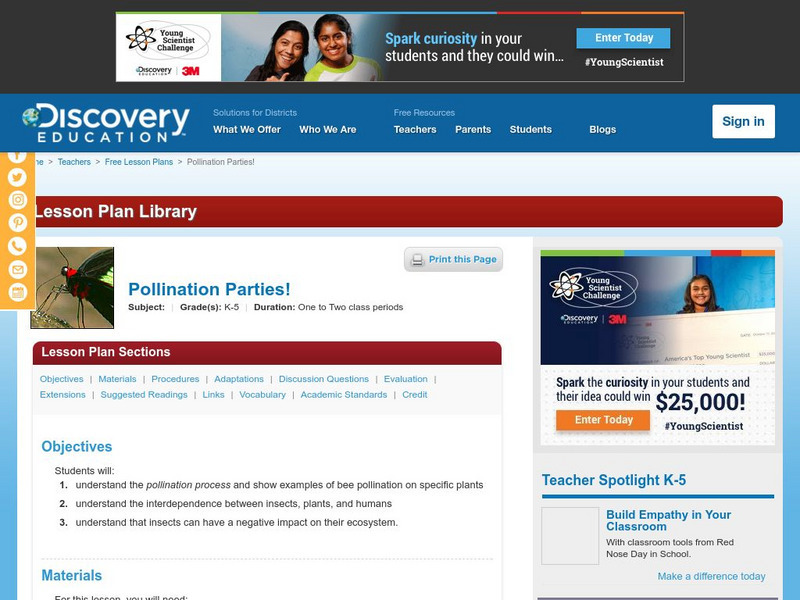The Wonder of Science
The Wonder of Science: K Ess3 1: Environmental Relationships
This NSTA vetted source includes resources to teach about the relationship between the needs of different plants and animals and the places they live. Included are assessment ideas, videos, examples, lesson plans, and photos of student...
The Wonder of Science
The Wonder of Science: K Ess2 2: Environmental Change
This NSTA vetted source includes resources to teach how plants and animals (including humans) can change the environment to meet their needs. Included are assessment ideas, videos, examples, lesson plans, and photos of student work.
Better Lesson
Better Lesson: Who's Your Plant Parent?
In this lesson, we observe our own plants to discover the answer to this big question: How are plants like their parents? Students will observe pre-planted seedlings and compare them to photographs of their parent plants. Included in...
Better Lesson
Better Lesson: Introducing Engineering
There is something gross under the cafeteria table. Do you pick it up? Gross! How about we mimic a bird's beak to solve the problem of picking up our trash? This lesson models walking through the first few steps of the Engineering Design...
Science & Plants for Schools
Science & Plants for Schools: Teaching Resources
A collection of teaching resources to help students explore plants! Resources investigate anatomy of plants, reproduction and life cycles, fruits, seeds, classification, photosynthesis, factors that affect plant growth, and respiration....
Discovery Education
Discovery Education: Lesson Plans Library K 5
This resource presents a lesson plan library which holds hundreds of lesson plans organized by grade level and subject area. Often rooted with an Internet research piece, each lesson plan contains specific objectives, procedures,...
Utah Education Network
Uen: S O I L Soil
Plants need nutrients to grow, those nutrients come from the soil, and nutrients can be added to soil to help plants grow better.
Discovery Education
Discovery Education: Pollination Parties
This instructional activity helps students understand the concept of pollination. Objectives, materials, procedures, adaptations, discussion questions, evaluation, extensions, suggested readings, links, vocabulary, and academic standards...
Utah Education Network
Uen: Weathering and Erosion Splashdown
Understand how plants and their roots help slow the erosion process.
Utah Education Network
Uen: Plant Puzzlers
Fourth graders will be presented with data cards about plants and they will need to determine how to sort the data.
Utah Education Network
Uen: Sunlight Necklaces
Create living necklaces to explore the power of sunlight.
Michigan Reach Out
Michigan Reach Out: Do Plants Need Sunlight?
Do plants need sunlight? What happens to plants if they do not get sunlight? Students will act like scientists in order to answer these questions. A scientist takes questions like this and then conducts an experiment to see what really...
Better Lesson
Better Lesson: Butterfly Bush Visitors
In this lesson, the children learn about how critters depend on the butterfly bush and how the butterfly bush, in turn, depends on it. Common Core writing skills are integrated as they take it to the next step, and create their own page...
Museum of Science
Mo S: Image Gallery of the Scanning Electron Microscope
At this resource you'll find everything from a mosquito head to a fly foot, from a dentist's drill to toilet paper! These and just about everything in between as seen through a scanning electron microscope.
Other
Hull Natural History Society: The Plants of Hull: A Millenium Atlas
This site provides maps and information about the vegetation in Hull, England.
Utah Education Network
Uen: Trb 4:4 Investigation 1 Identify & Compare Fossils
Fourth graders will look at different items to see if they can recognize fossils.
PBS
Pbs Learning Media: Sesame Street: Teeny Tiny Garden Craft
Grow your own garden with this lesson plan. Students will learn about plants while they create their own garden.
PBS
Pbs Learning Media: Nature Cat: Story Exploration Packet (Spanish)
Mientras ven Nature Cat, utilice estas herramientas para guiar las discusiones y actividades de aprendizaje. Tally ho!
PBS
Pbs Learning Media: Nature Cat: Story Exploration Packet
As you watch Nature Cat, use these tools to guide discussions and learning activities. Includes printables on story elements, alternate endings, vocabulary words, character traits, an episode map, and a Venn diagram.
Globe
The Globe Program: Earth System Module
Activities help students experiment with what plants need in terms of water, sunlight, and soil, explain how the Earth's processes and components are interconnected, and demonstrate their knowledge of how water, air, soil, and living...
University of Illinois
University of Illinois Extension: The Great Plant Escape
Detective Le Plant has found a strange note attached to his door. It says, "A bulb is a bulb, but not always." You and Detective Le Plant are now about to begin to unravel the true meaning of this message. Follow the clues, answer...
University of Illinois
University of Illinois Extension: Plantenstein Is the Suspect!
Detective Le Plant has discovered that one plant can produce many other plants. He needs you to help him find out how this happens. Follow along and learn about the parts of flowers and reproduction. Along the way, you will be quizzed!
San Diego Zoo Global
San Diego Zoo: Flowers
Certain plants are known for their eye-catching blooms. Think of roses, orchids, carnations, and tulips. We often refer to these plants as "flowers." A flower, though, is just one part and quite an important part of a plant. Not all...









